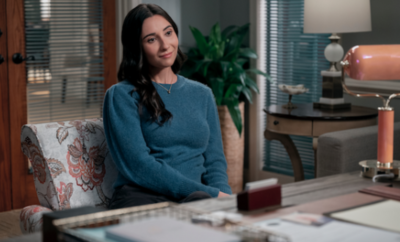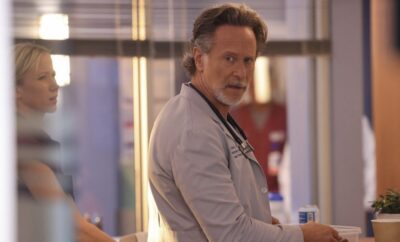
Interviews
Marlyne Barrett – Chicago Med
By: Jamie Steinberg
Q) What are the recent projects that you are working on?
A) One of the biggest organizations I’ve been working with lately is called The Way Out (“La Sortie”). La Sortie is the French name and “The Way Out” is the translation. It’s based out of Montreal and it’s an organization that establishes homes to help people that have been rescued from sex trafficking. We just finished our big fundraiser event. We are still accepting donations, but once a year we have a big gala. We try to get a lot of local people involved in businesses, philanthropy or individuals interested in helping the kids that are being rescued. We were able to raise enough funds to help eight to sixteen girls within the next year to year and a half. It’s exciting stuff! Then, we have a pretty hefty schedule with “Chicago Med.” We’re currently shooting twenty episodes this season and our sister shows are shooting twenty-two. That is pretty much the bulk of our time. I’m also a writer and love writing my own projects and direct. So, I’m a busy bee!
Q) How was your character, Maggie Lockwood, originally described to you?
A) So, Maggie Lockwood is the charge nurse of the trauma ED of Chicago Med. She is one of those key figures that holds storylines together. In all hospitals, you’ll find that one who wants to be sure that the ED/Trauma is running faithfully, that the organization itself is fluid. So, she serves as the charge nurse who takes care of the medicine and at the same time she’s a great friend to everyone who is working in those high pressure situations. So, she’s a great friend to Dr. Halstead (Nick Gehlfuss), Dr. Manning (Torrey DeVitto) and Sharon Goodwin (S. Epatha Merkerson), who is the director of the hospital, because she is Sharon’s mentee. And I think she represents all these nurses that are working really hard that are just trying to create a great environment for these patients to come into. People often forget themselves and one day wake up somewhere after achieving this goal of being this great nurse and then all of a sudden wake up and think, “I’m lonely.” I think that’s Maggie’s situation when we start this season.
Q) Was there anything you added to her that wasn’t written for you?
A) Yeah, I think there is an edge to the Southside Chicagoan that I wanted to add. When we first landed here and we did our training at Rush, one of the things I did was drive around trying to get to know the city a little bit. I ended up driving everywhere from the Northside, Ukrainian Village, The Loop and I went to the Southside. You’re actually looking for the place that is going to make your heart pulse. And I remember I met this nurse at Cook County named Gloria and I remember thinking, “Wait a second. I think that’s where Maggie would be in twenty years.” She was a badass nurse! A girl had come in and she had been hit by a semi-truck and her leg was torn. It was such a difficult situation and Gloria was cool as beans! Cool. She had two syringes that she was holding in one hand and she as like flushing the other one through the IV. There was panic everywhere and she was the one saying, “Okay, you got this. Call the shot.” She was calling it like it was a baseball game in the ninth inning of The World Series, but meanwhile you could see that this was a code red. It was a need for surgery right away, but she was cool and levelheaded. Her experience was extraordinary. But you could see at the same time in her eyes that she had a lot of things going on at home. I was saying to myself, “What must her life be like at home.” Her experience was written on her face and it was just all there for me. I just decided that was who I wanted to be. I wanted to be the woman who loved Chicago so much that she was giving her all to it and to the people who were victims of all sorts of accidents happening in the streets. Then, she comes in there selfless and then goes home and has forgotten that she has the weight of the world on her shoulders, too. I couldn’t tell if she was married. I didn’t go into that kind of private conversation with her. I couldn’t tell you if she had children, but I figured she did. The expressions on her face led me to believe there was more to her life than loneliness. So, I tend to like to create characters that are based on real people, but maybe just one or two of their faces without knowing the totality of their stories. But I definitely wanted to make Maggie Lockwood a Chicagoan at heart.
Q) Was there an instant connection with the cast or did it take some time to bond?
A) When you uproot a bunch of artists and bring them to a foreign city that I think what happens is that you are going to spend so much time together that you want to get to know each other. I think what makes us a great cast is our ability to humanly connect with one another and I call it our “turn around.” Our resolution to conflict is extraordinary. I think sometimes you look at film stars and TV stars and you think there is this distance between the job and their humanity because the job itself is just so demanding. You want to do the job (the sixteen hours or whatever it takes) that you forget that in order for us to get to a place where we are so authentic in our expression we’ve dug into each other’s hearts. I think our turn around in each other’s relationships is extraordinary to watch. Just with choices, if I want to go a certain way with my character and someone else doesn’t you have to negotiate that. I’m talking about the things that are outside of the page. So, it’s just real great human beings. I think “Chicago Fire” set a precedence and then “Chicago PD” did it, too. So, as soon as a group of new actors showed up on the series we just naturally swallow it into this great family that we’re trying to create, which is an expression of Chicago. “Chicago Fire” did it first, to be honest. Then, when I landed on deck, “Chicago Fire” and “Chicago PD” just already had a great relationship. We started gravitating towards each other’s sets and became a member of something that pre-existed – a way of behaving. I remember David Eigenberg telling me about the family situation here and I just knew I wanted to be a part of it.
Q) What do you do to shake off some of the darkness of episodes?
A) There is a high when you are done with those big scenes because we have some big scenes that we go through. And there is a process we go through unwinding from it that it is almost – I call it “bio-spiritual,” meaning once I take off the outfit and take off the makeup we’ll check in with myself and see where I’m at. I’ll either do it by listening to music, reading a book or connecting with either cast members who did the same scene with me. Because sometimes you have cast members that are on the same topic as you and the other cast members are living another storyline. So, although they understand what you are going through they didn’t share the experience at the moment. So, you’ll shake it off with the cast members that you did live with it. There are just the exterior things like listening to music or reading books. For me, there is just a lot of prayer and meditation in there. When you have been pretending for two hours that someone has been dying, you teared up or have broken up with someone your body is your only tool. So, you need something to shake it off.
Q) With the various One Chicago episodes there are plenty of opportunities to work with stars of other series. Is there anyone you haven’t worked with yet that you wish you had a scene with?
A) I was thinking about this the other day. Paddy [Flueger] on “Chicago PD “is a good friend and I’d love to have a storyline with him. I think he’s a brilliant actor and he’s one of those brilliant creative types. I’ve worked with pretty much everyone. I’d love to do something with Eamonn Walker. I’d love to see him just lose his lid on me, just be mad at me for something. He’s just such a powerhouse of a performer. I think on my set, I work a lot with Dr. Charles (Oliver Platt) and support him, but it would be fun to have a storyline where I got involved in his life – the way I’m involved with Sharon Goodwin. That would be something interesting. Kara [Killmer] over on Fire is someone I love a lot. She always brings a lot to the table. Also, badass Burgess (Marina Squerciati). Badass Burgess for some reason. I need to see her causing something where she and Maggie could get to know each other.
Q) What do you think it is about the series that has made it such a fan favorite?
A) I think it is a combination of what you were saying with the actors and their collaborations together coupled with this idea that America is really involved in the healthcare system right now – the reformation of it and the need to understand the baby boomers who are now all in their 60’s or heading towards their 60’s. People want to know what is going on their healthcare. The demographic of the baby boomers is getting really high and people want to be able to say that, “If something happens to me, I still have about forty good years of life left in me. And I want to be able to see my grandkids grow up. I want to be able to do all of that in a functioning body.” So, I think that is bringing up a lot of conversation and I think as the kids to those baby boomers are watching their parents grow up (because they are probably in their early 30s or mid 40’s) are asking the same questions like, “How am I going to take care of mom if her pensions runs away? How am I going to take care of mom or dad if something happens to them and their insurance can’t cover it? What if they need a surgery that is going to cost them $200,000? What am I going to do?” So, it is a big conversation going on in America now that Americans keep looking to great story developers like Dick Wolf and Wolf Films to at least get their brains ticking on the topic. I think often it starts with the malaise, which is “I had a heart attack.” Then, the malaise goes into this conversation, “Does my insurance cover it? Who am I with? Am I with Blue Cross/Blue Shield? Am I with Kaiser?” Then, it is “What do I cover? What does the hospital cover?” Next, you get to the further question, “Long term, let’s say mom or dad didn’t make it. Who pays the bill?” There is a lot going on with healthcare right now and I think “Chicago Med” is at the forefront of that conversation and at the forefront of discussing the malaise, everything from birthing to cancer issues to brain injuries. There is just so much going on and then the spontaneous issues like “I got hit by a car and I never thought that I would need insurance.” I think that’s what is great about these current situation where people have been imposed on having the idea of healthcare versus an event happens and no one knows what to do and the county is the only hospital they can go to and the county doesn’t have the infrastructure to take care of that person and we’re watching a person pass away. That’s heartbreaking.
Q) The show does give a great light to the current status of our healthcare industry.
A) The cherry on the sundae of all of that is the same people who are caring for all of those people are going through the same issues. So, yeah Maggie Lockwood works at a hospital where she gets covered, but she still has siblings she has to think about. She still has a family structure that she has to think about. She has to understand it. She still comes from a neighborhood where although she can afford it, there are great storylines like we have had in the last few episodes where I confronted the head of the ED, Dr. Stohl (Eddie Jemison). I said to him, “I understand that we need to take care of all of the people who might come and create some criminal act in the hospital, but what about the people who can’t afford the care that we provide and are rolling in? What do we do with those people?” I think Maggie was specifically discussing the people that live in her neighborhood. She could have afforded to leave the Southside, but she didn’t. And that’s a discussion I’ve had many, many times with myself. Does Maggie still live on the Southside of Chicago? Does she still live in places where she doesn’t have to anymore? And I keep on coming up with the answers that she does. Why does she still live there? She wants to be part of the transitioning of that neighborhood.
Follow Marlyne Barrett on Social Media:
Instagram- @barrettmarlyne
Twitter- @barrettmarlyne





You must be logged in to post a comment Login